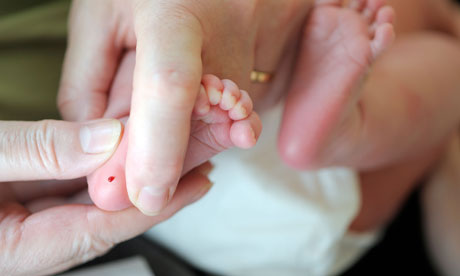Many people may not be aware that every Australian’s first encounter with pathology takes place within the first few hours of life.
Babies born in Australia are tested using a ‘heel prick’ test or bloodspot test; a small amount of blood is drawn from the baby’s heel and tested for 25 different health conditions, usually within 48 hours of birth.
The test is also known as the ‘Guthrie’ test after Robert Guthrie who invented a bloodspot test for phenylketonuria (PKU) and went on to create further tests for inborn errors of metabolism.
Guthrie brought his PKU test to Australia and New Zealand in 1965 and it was quickly adopted.
The reason for testing babies so early is that some of the conditions being tested for can have serious consequences if left untreated, so it is essential that doctors know as soon as possible if a baby is in need of extra care.
The most common conditions tested for are:
- congenital hypothyroidism – possible consequences include growth failure, intellectual impairment
- cystic fibrosis – can cause impaired digestive and respiratory function, infections and decreased life span
- amino acid disorders such as phenylketonuria – may cause developmental delay, intellectual impairment, seizures
- fatty acid oxidation disorders – can lead to muscle problems, poor feeding, vomiting, seizures, sudden death
Fortunately, conditions like those above can be successfully treated, for example, hormone supplements can be given to children with congenital hypothyroidism to prevent severe complications and allow them to live a relatively normal life.
The newborn bloodspot screening program is currently under review by a working group of health officials. The review will look at advances in technology to ensure that the program is keeping pace with the latest testing techniques and may also consider adding other conditions to the list of those currently tested for.
There are recommendations from the Human Genetics Society of Australasia and the Royal College of Pathologists of Australasia that other conditions be added to the program, such as Congenital Adrenal Hyperplasia (CAH), another rare genetic disorder that can have severe consequences in some cases.
The benefit to children and families is clear here and is a shining example of how pathology is integral to patient care, empowering doctors to help prevent disability and giving patients the chance to lead a healthy life.
Image credit: Alamy via The Guardian http://www.theguardian.com/society/2012/apr/10/society-daily-nhs-failings-newborn-babies

